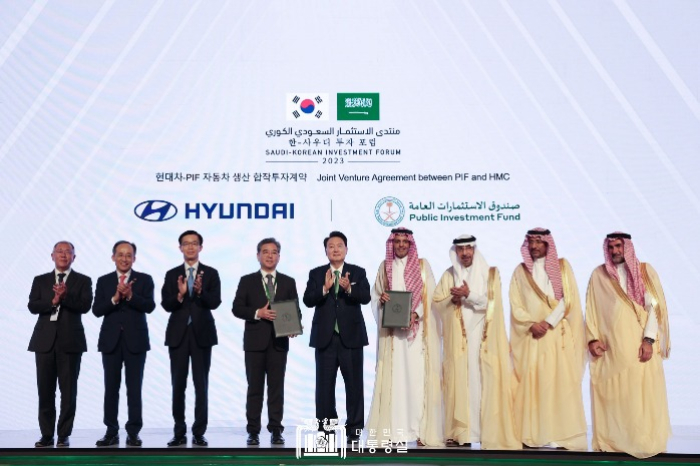
RIYADH – Hyundai Motor Co. has agreed with the Public Investment Fund, Saudi Arabia’s sovereign fund, to set up a joint venture to build a car manufacturing plant in Saudi Arabia, the Korean auto giant’s first-ever electric vehicle manufacturing plant in the Middle East.
Hyundai Motor announced on Monday that it and PIF will establish a JV with a 70% stake to be held by PIF and the remaining 30% by the Korean carmaker and invest more than $500 million together to build a plant to produce 50,000 vehicles – both combustion engine and electric-powered cars – per year under the JV agreement signed on Sunday.
They aim to break ground on the plant in 2024 to begin its commercial production in 2026.
This is a follow-up measure to the Korean top automaker’s memorandum of understanding signed earlier this year with the Saudi trade ministry to build an EV assembly factory in Saudi Arabia.
The plant, which would be Hyundai Motor’s first-ever EV production site in the Middle East, is expected to serve as its gateway to the region and North Africa.
It is also expected to ensure Hyundai Motor and its sibling Kia Corp. to meet their latest target announced Friday to sell 550,000 cars annually in the Middle East by 2030 to control about 20% of the regional market with their expanded EV lineup.

Hyundai Motor Group Chairman Chung Euisun is visiting the Middle Eastern country as a member of the business delegation accompanying South Korean President Yoon Suk Yeol during his state visit to Saudi Arabia.
Hyundai Motor’s car assembly plant agreement is part of $15.6 billion business deals signed between Korea and Saudi Arabia on Sunday, the second day of Korean President Yoon’s four-day state visit to the oil kingdom nation.
DEEPENING NATIONAL ECONOMIC TIES
The Korean presidential office on Monday announced that Korean businesses and government agencies signed 46 memorandums of understanding and contracts with their counterparts in Saudi Arabia on Sunday.
Combined with the new deals, the two countries’ total deals have ballooned to $44.6 billion. The two nations signed another large batch of deals worth $29 billion signed in November last year during a Seoul visit by Mohammed bin Salman, the crown prince and prime minister of Saudi Arabia.
The new deals are expected to deepen the two nations’ ties beyond the energy partnership.

President Yoon said during his expanded summit with the crown prince, de facto Saudi Arabian ruler, on Sunday that Korea is an optimal partner of Saudi Arabia in the post-oil era and hoped the two countries can reinforce partnerships across a wider range of sectors, including clean energy, advanced technologies, tourism and cultural exchanges.
The two countries’ expanded partnership especially focuses on accelerating the Middle Eastern country’s Vision 2030, the national initiative led by the Saudi crown prince to create new business opportunities in green energy and technology sectors to reduce the Middle Eastern country’s hefty reliance on fossil energy for revenue.
Hyundai Motor’s car assembly plant is expected to drive the development of Saudi Arabia’s automotive and mobility ecosystem and woo more investors to the country’s auto sector, a new industry in the oil-exporting nation.
“Partnering with Hyundai is another significant milestone for PIF in successfully enabling and accelerating the growth of Saudi Arabia’s automotive ecosystem – one of our 13 priority sectors,” Yazeed A. Al-Humied, Deputy Governor and Head of MENA Investments at PIF, said in a press release.
Hyundai Motor also signed an MOU with Korea Automotive Technology Institute (KATECH), Air Products Qudra (APQ) and the Saudi Public Transport Company (SAPTCO) to develop an ecosystem for hydrogen-based mobility in the Kingdom of Saudi Arabia.
Other Korean conglomerates in non-oil industries have joined Hyundai Motor to lead a new phase of the two nations’ collaboration, which is expected to create the second wave of the so-called Middle Eastern boom.
Middle Eastern countries including Saudi Arabia were the main foreign income source for Korea between the 1970s and early 1980s, when many Korean construction companies won a raft of large-scale orders to build bridges and high-rise buildings.

CLEAN ENERGY, MEDICAL AND BAKERY
As part of the 46 deals signed on Sunday, Korea’s Ministry of Trade, Industry and Energy signed the Hydrogen Oasis Initiative with Saudi’s Ministry of Energy to foster the two nations’ cooperation in green and clean hydrogen.
Korea Electric Power Corp., POSCO Holdings Inc. and Lotte Chemical Corp. signed a separate deal, a letter of intent, worth $15.5 billion with Saudi’s state-owned petroleum and natural gas company Saudi Aramco, or Saudi Arabian Oil Co., to produce blue ammonia, considered clean energy composed of hydrogen and nitrogen.
Korean medical device company Poonglim Pharmatech Inc. and Saudi Arabia’s All Care Group signed an MOU to set up a JV factory in the Middle Eastern country to produce medical devices.
Korea’s food and beverage giant SPC Group will also venture into Saudi Arabia with its bakery chain brand Paris Baguette.
Korea’s state-run Korea National Oil Corp. has also signed an oil storage agreement with Aramco to store 5.3 million barrels in its reserves in Korea, a move expected to stabilize the Asian country’s oil supply. Saudi is Korea’s No. 1 oil provider.
The two nations also signed business deals in digital, robotics, smart farm, content and shipbuilding sectors.
President Yoon will visit Qatar for two days after he completes his state visit to Saudi Arabia on Oct. 24.
Write to Hyung-Joo Oh at [email protected]
Sookyung Seo edited this article.
